Analysis of UK Legislation on Equality, Diversity, and Fair Treatment
VerifiedAdded on 2023/01/20
|16
|1465
|48
Report
AI Summary
This report provides an overview of the UK legislation concerning equality, diversity, and fair treatment within public service organizations. It begins by defining these key concepts and emphasizes their importance in the legal framework. The report then delves into specific legislation, including the Equality Act 2010, Employment Equality (Age) Regulations 2006, Employment Equality (Sex Discrimination) Regulations 2005, Employment Equality (Religion or Belief) Regulations 2003, and Employment Equality (Sexual Orientation) Regulations 2003, detailing their purpose and implementation. Furthermore, the report explores the significance of understanding unconscious bias, prejudice, and discriminatory behavior in the public sector, highlighting their potential impact on organizational operations and customer relationships. It emphasizes the benefits of addressing these issues, such as compliance with legislation, improved customer relations, and enhanced staff retention. The report concludes by summarizing the key points and emphasizing the role of various policies and legislation in promoting equality and fair treatment in public services.
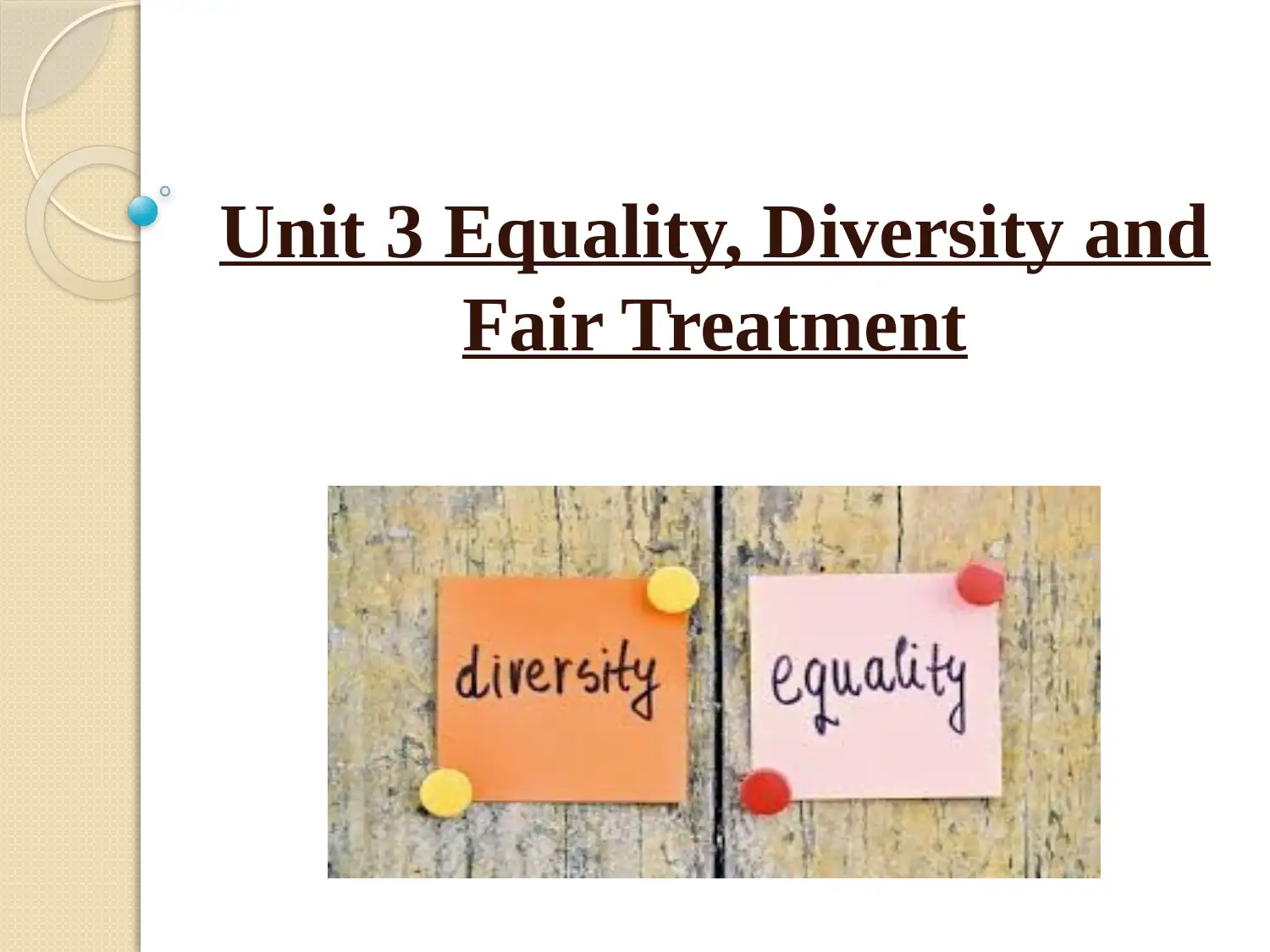
Unit 3 Equality, Diversity and
Fair Treatment
Fair Treatment
Paraphrase This Document
Need a fresh take? Get an instant paraphrase of this document with our AI Paraphraser
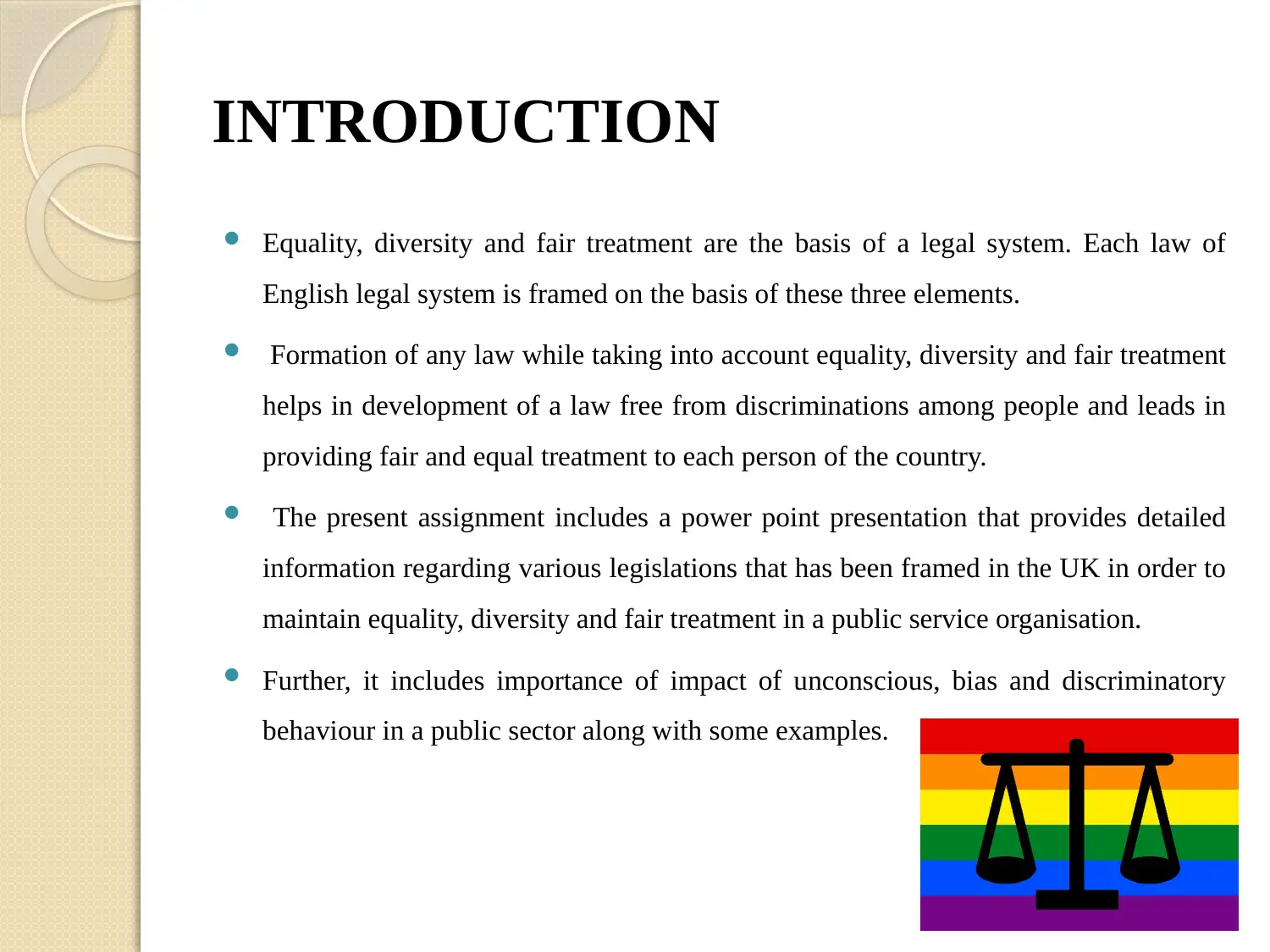
INTRODUCTION
Equality, diversity and fair treatment are the basis of a legal system. Each law of
English legal system is framed on the basis of these three elements.
Formation of any law while taking into account equality, diversity and fair treatment
helps in development of a law free from discriminations among people and leads in
providing fair and equal treatment to each person of the country.
The present assignment includes a power point presentation that provides detailed
information regarding various legislations that has been framed in the UK in order to
maintain equality, diversity and fair treatment in a public service organisation.
Further, it includes importance of impact of unconscious, bias and discriminatory
behaviour in a public sector along with some examples.
Equality, diversity and fair treatment are the basis of a legal system. Each law of
English legal system is framed on the basis of these three elements.
Formation of any law while taking into account equality, diversity and fair treatment
helps in development of a law free from discriminations among people and leads in
providing fair and equal treatment to each person of the country.
The present assignment includes a power point presentation that provides detailed
information regarding various legislations that has been framed in the UK in order to
maintain equality, diversity and fair treatment in a public service organisation.
Further, it includes importance of impact of unconscious, bias and discriminatory
behaviour in a public sector along with some examples.
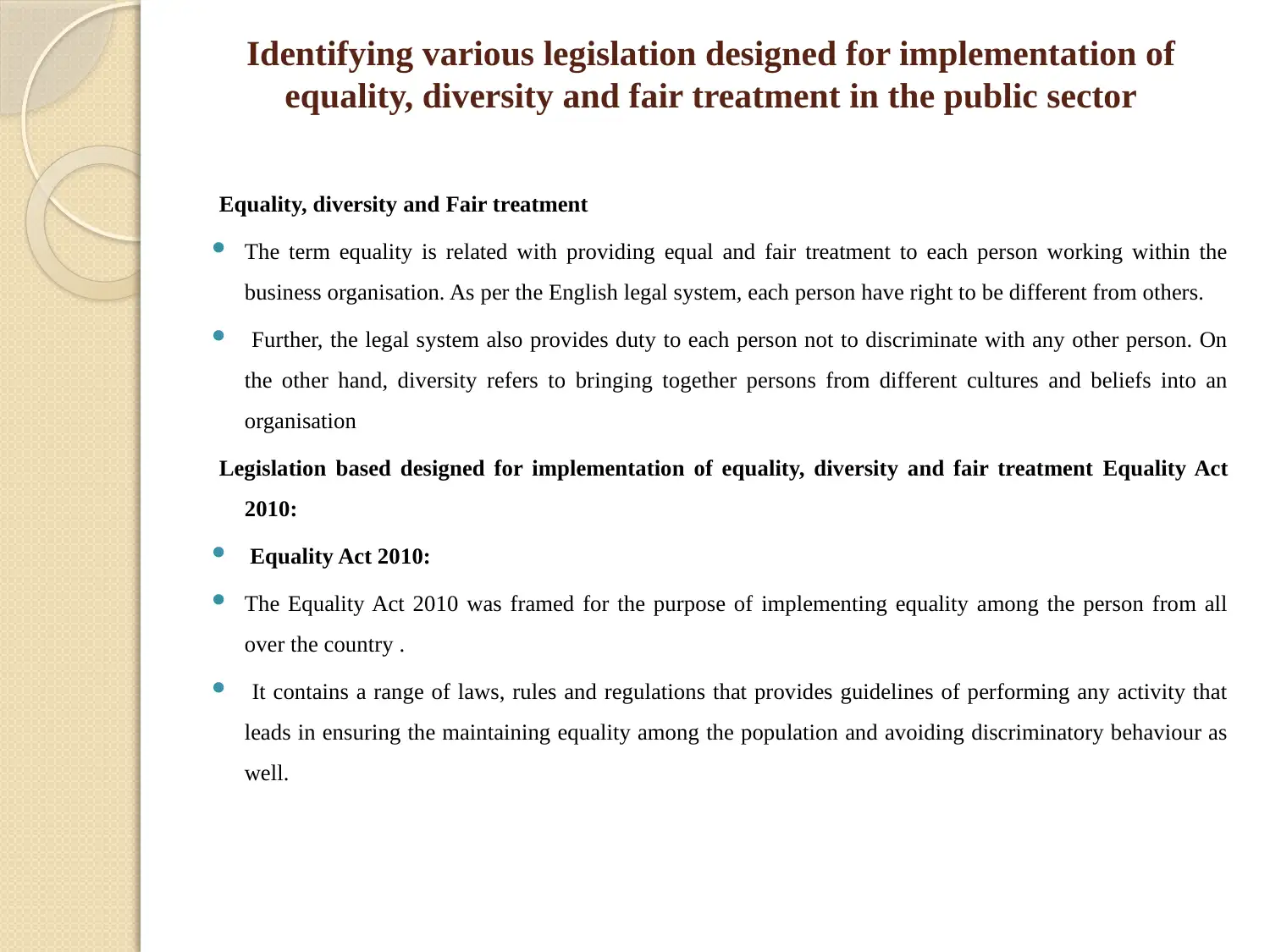
Identifying various legislation designed for implementation of
equality, diversity and fair treatment in the public sector
Equality, diversity and Fair treatment
The term equality is related with providing equal and fair treatment to each person working within the
business organisation. As per the English legal system, each person have right to be different from others.
Further, the legal system also provides duty to each person not to discriminate with any other person. On
the other hand, diversity refers to bringing together persons from different cultures and beliefs into an
organisation
Legislation based designed for implementation of equality, diversity and fair treatment Equality Act
2010:
Equality Act 2010:
The Equality Act 2010 was framed for the purpose of implementing equality among the person from all
over the country .
It contains a range of laws, rules and regulations that provides guidelines of performing any activity that
leads in ensuring the maintaining equality among the population and avoiding discriminatory behaviour as
well.
equality, diversity and fair treatment in the public sector
Equality, diversity and Fair treatment
The term equality is related with providing equal and fair treatment to each person working within the
business organisation. As per the English legal system, each person have right to be different from others.
Further, the legal system also provides duty to each person not to discriminate with any other person. On
the other hand, diversity refers to bringing together persons from different cultures and beliefs into an
organisation
Legislation based designed for implementation of equality, diversity and fair treatment Equality Act
2010:
Equality Act 2010:
The Equality Act 2010 was framed for the purpose of implementing equality among the person from all
over the country .
It contains a range of laws, rules and regulations that provides guidelines of performing any activity that
leads in ensuring the maintaining equality among the population and avoiding discriminatory behaviour as
well.
⊘ This is a preview!⊘
Do you want full access?
Subscribe today to unlock all pages.

Trusted by 1+ million students worldwide
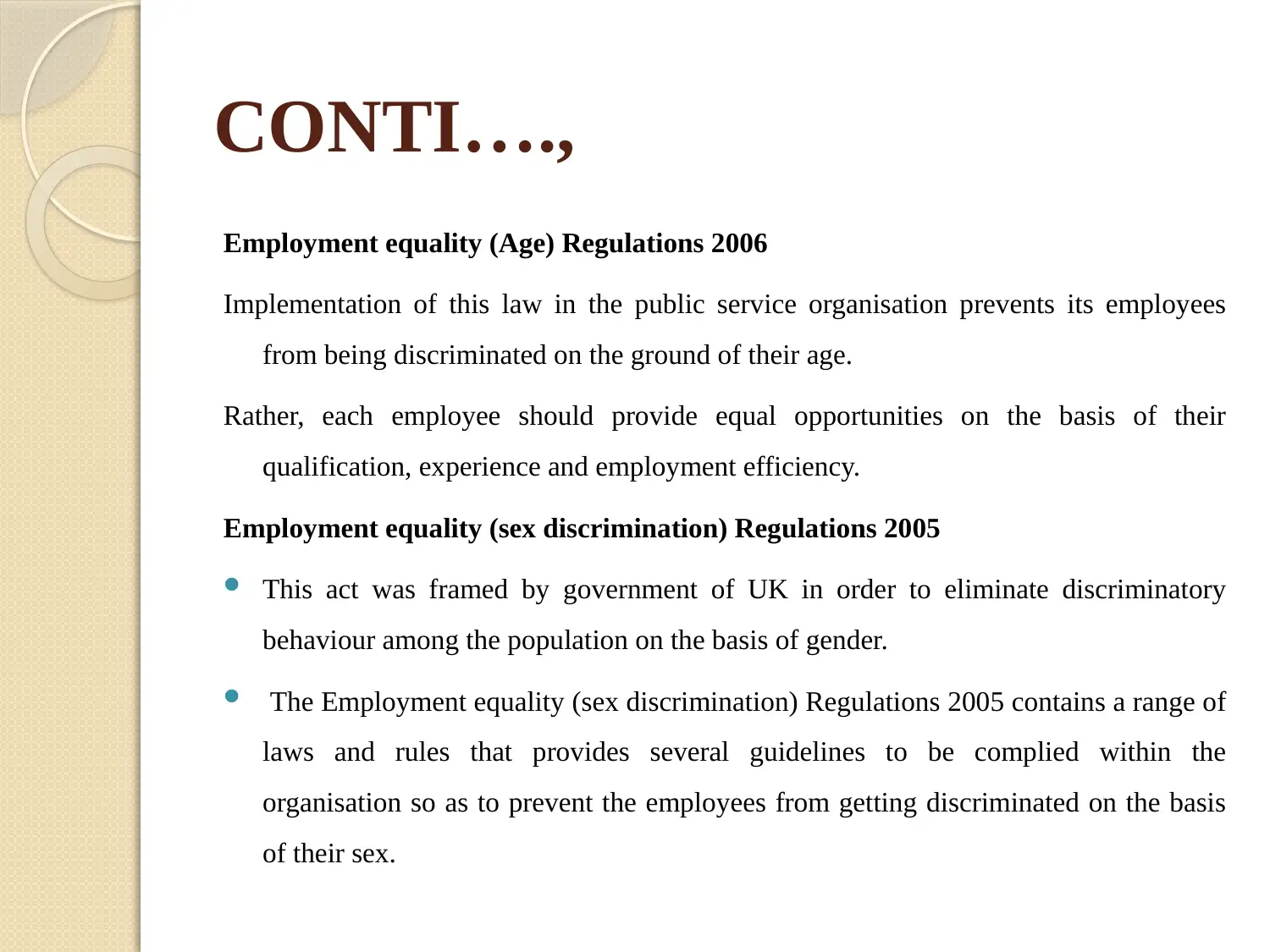
CONTI….,
Employment equality (Age) Regulations 2006
Implementation of this law in the public service organisation prevents its employees
from being discriminated on the ground of their age.
Rather, each employee should provide equal opportunities on the basis of their
qualification, experience and employment efficiency.
Employment equality (sex discrimination) Regulations 2005
This act was framed by government of UK in order to eliminate discriminatory
behaviour among the population on the basis of gender.
The Employment equality (sex discrimination) Regulations 2005 contains a range of
laws and rules that provides several guidelines to be complied within the
organisation so as to prevent the employees from getting discriminated on the basis
of their sex.
Employment equality (Age) Regulations 2006
Implementation of this law in the public service organisation prevents its employees
from being discriminated on the ground of their age.
Rather, each employee should provide equal opportunities on the basis of their
qualification, experience and employment efficiency.
Employment equality (sex discrimination) Regulations 2005
This act was framed by government of UK in order to eliminate discriminatory
behaviour among the population on the basis of gender.
The Employment equality (sex discrimination) Regulations 2005 contains a range of
laws and rules that provides several guidelines to be complied within the
organisation so as to prevent the employees from getting discriminated on the basis
of their sex.
Paraphrase This Document
Need a fresh take? Get an instant paraphrase of this document with our AI Paraphraser
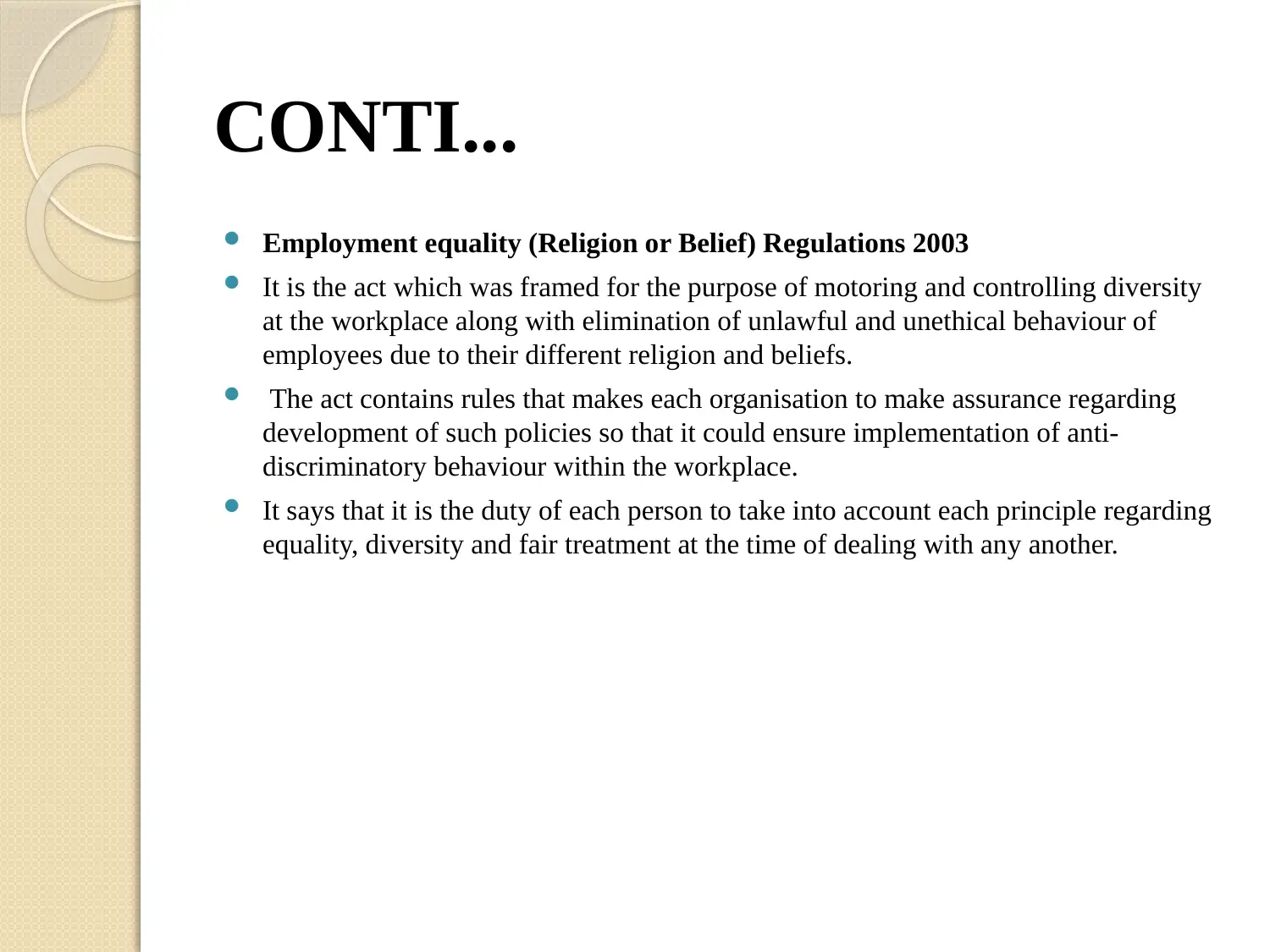
CONTI...
Employment equality (Religion or Belief) Regulations 2003
It is the act which was framed for the purpose of motoring and controlling diversity
at the workplace along with elimination of unlawful and unethical behaviour of
employees due to their different religion and beliefs.
The act contains rules that makes each organisation to make assurance regarding
development of such policies so that it could ensure implementation of anti-
discriminatory behaviour within the workplace.
It says that it is the duty of each person to take into account each principle regarding
equality, diversity and fair treatment at the time of dealing with any another.
Employment equality (Religion or Belief) Regulations 2003
It is the act which was framed for the purpose of motoring and controlling diversity
at the workplace along with elimination of unlawful and unethical behaviour of
employees due to their different religion and beliefs.
The act contains rules that makes each organisation to make assurance regarding
development of such policies so that it could ensure implementation of anti-
discriminatory behaviour within the workplace.
It says that it is the duty of each person to take into account each principle regarding
equality, diversity and fair treatment at the time of dealing with any another.
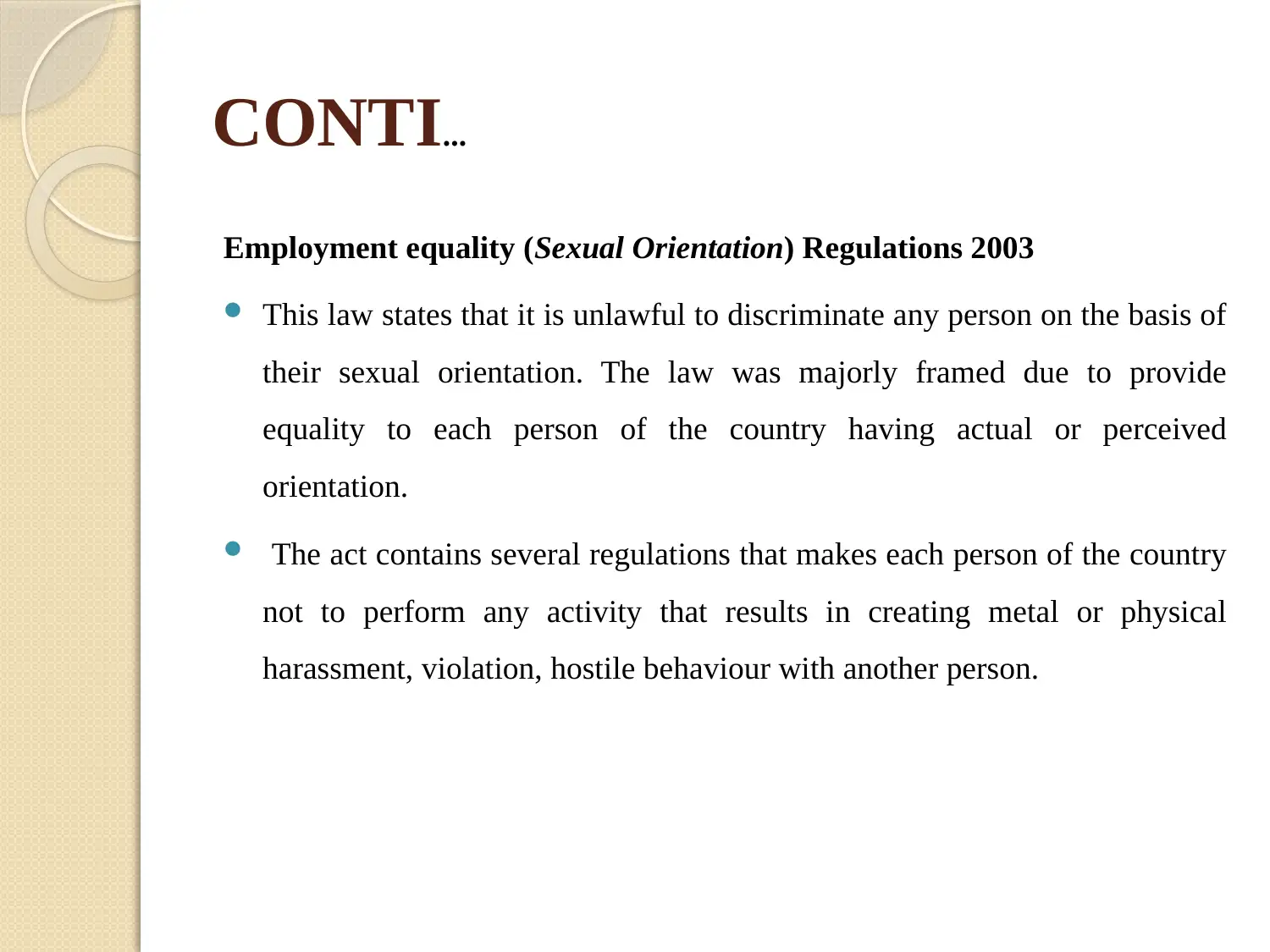
CONTI...
Employment equality (Sexual Orientation) Regulations 2003
This law states that it is unlawful to discriminate any person on the basis of
their sexual orientation. The law was majorly framed due to provide
equality to each person of the country having actual or perceived
orientation.
The act contains several regulations that makes each person of the country
not to perform any activity that results in creating metal or physical
harassment, violation, hostile behaviour with another person.
Employment equality (Sexual Orientation) Regulations 2003
This law states that it is unlawful to discriminate any person on the basis of
their sexual orientation. The law was majorly framed due to provide
equality to each person of the country having actual or perceived
orientation.
The act contains several regulations that makes each person of the country
not to perform any activity that results in creating metal or physical
harassment, violation, hostile behaviour with another person.
⊘ This is a preview!⊘
Do you want full access?
Subscribe today to unlock all pages.

Trusted by 1+ million students worldwide
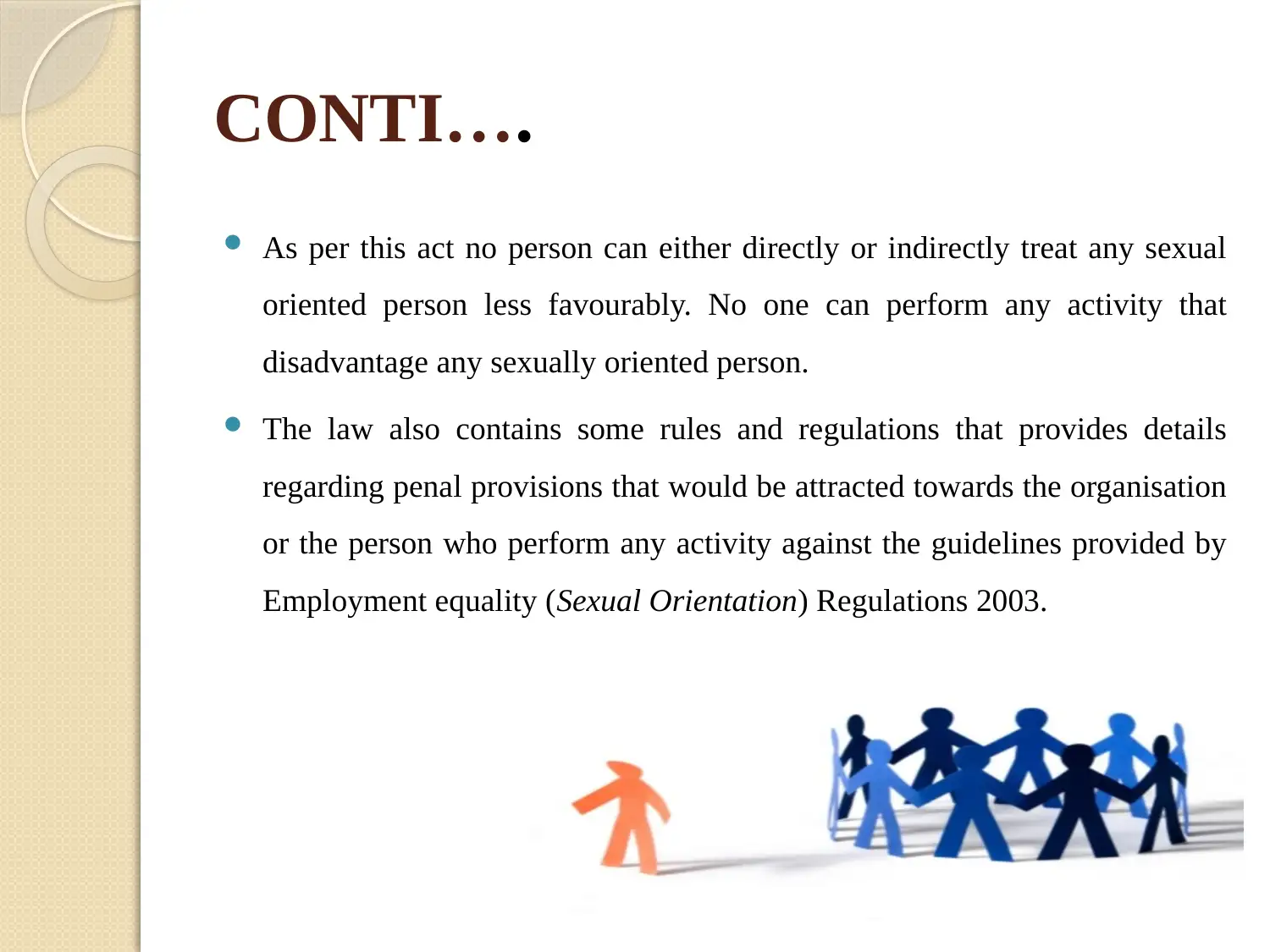
CONTI….
As per this act no person can either directly or indirectly treat any sexual
oriented person less favourably. No one can perform any activity that
disadvantage any sexually oriented person.
The law also contains some rules and regulations that provides details
regarding penal provisions that would be attracted towards the organisation
or the person who perform any activity against the guidelines provided by
Employment equality (Sexual Orientation) Regulations 2003.
As per this act no person can either directly or indirectly treat any sexual
oriented person less favourably. No one can perform any activity that
disadvantage any sexually oriented person.
The law also contains some rules and regulations that provides details
regarding penal provisions that would be attracted towards the organisation
or the person who perform any activity against the guidelines provided by
Employment equality (Sexual Orientation) Regulations 2003.
Paraphrase This Document
Need a fresh take? Get an instant paraphrase of this document with our AI Paraphraser
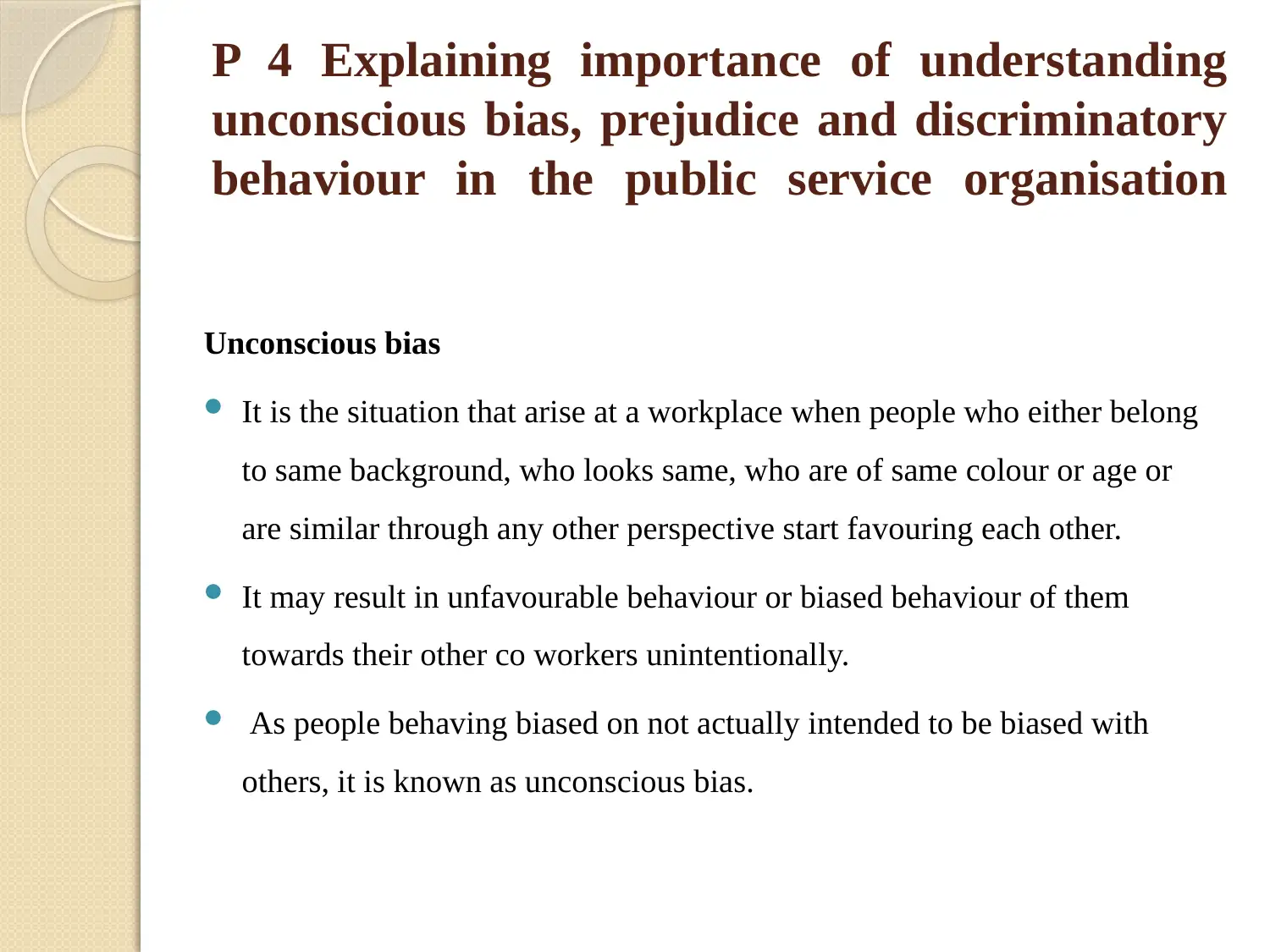
P 4 Explaining importance of understanding
unconscious bias, prejudice and discriminatory
behaviour in the public service organisation
Unconscious bias
It is the situation that arise at a workplace when people who either belong
to same background, who looks same, who are of same colour or age or
are similar through any other perspective start favouring each other.
It may result in unfavourable behaviour or biased behaviour of them
towards their other co workers unintentionally.
As people behaving biased on not actually intended to be biased with
others, it is known as unconscious bias.
unconscious bias, prejudice and discriminatory
behaviour in the public service organisation
Unconscious bias
It is the situation that arise at a workplace when people who either belong
to same background, who looks same, who are of same colour or age or
are similar through any other perspective start favouring each other.
It may result in unfavourable behaviour or biased behaviour of them
towards their other co workers unintentionally.
As people behaving biased on not actually intended to be biased with
others, it is known as unconscious bias.
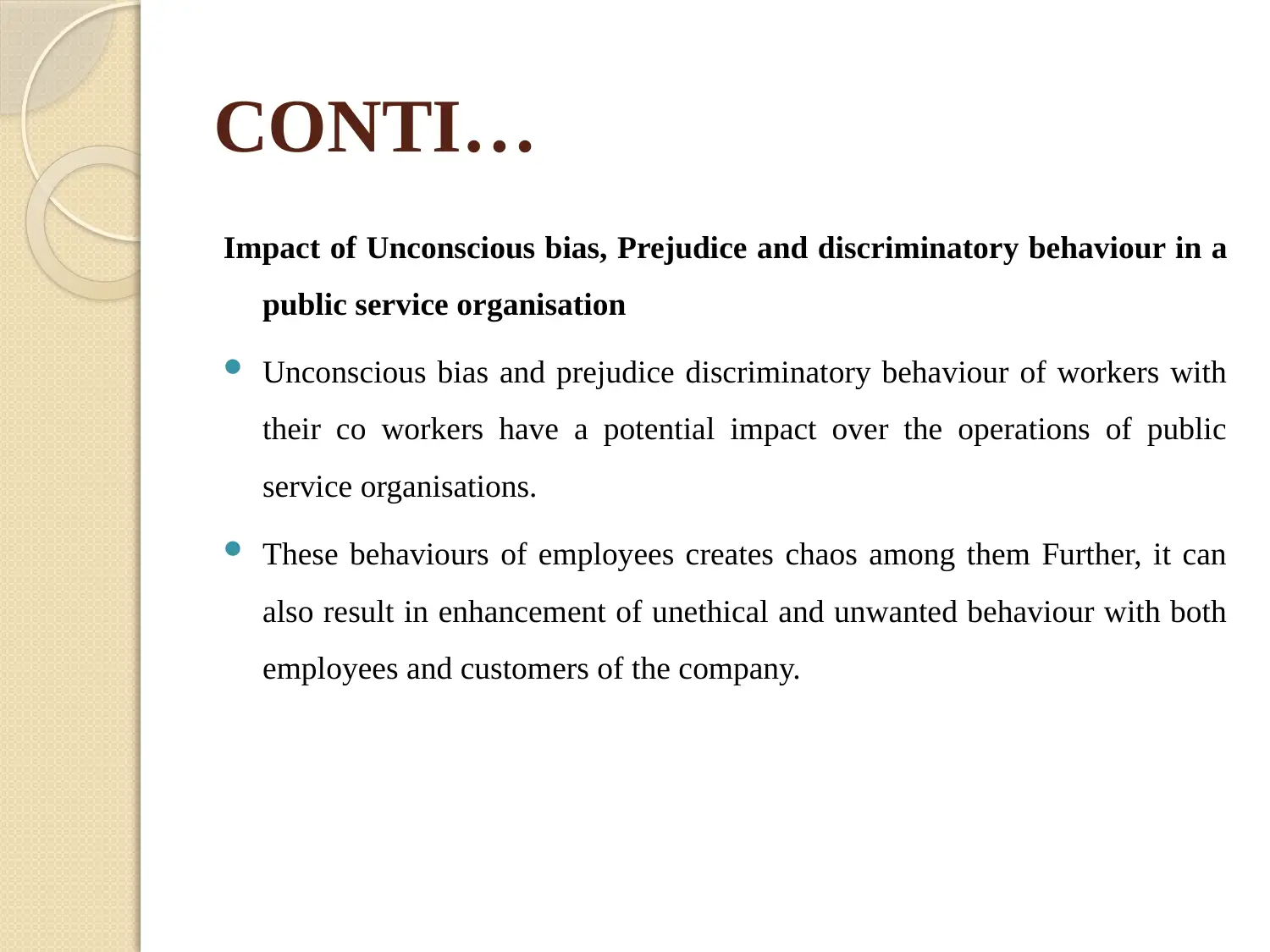
CONTI…
Impact of Unconscious bias, Prejudice and discriminatory behaviour in a
public service organisation
Unconscious bias and prejudice discriminatory behaviour of workers with
their co workers have a potential impact over the operations of public
service organisations.
These behaviours of employees creates chaos among them Further, it can
also result in enhancement of unethical and unwanted behaviour with both
employees and customers of the company.
Impact of Unconscious bias, Prejudice and discriminatory behaviour in a
public service organisation
Unconscious bias and prejudice discriminatory behaviour of workers with
their co workers have a potential impact over the operations of public
service organisations.
These behaviours of employees creates chaos among them Further, it can
also result in enhancement of unethical and unwanted behaviour with both
employees and customers of the company.
⊘ This is a preview!⊘
Do you want full access?
Subscribe today to unlock all pages.

Trusted by 1+ million students worldwide
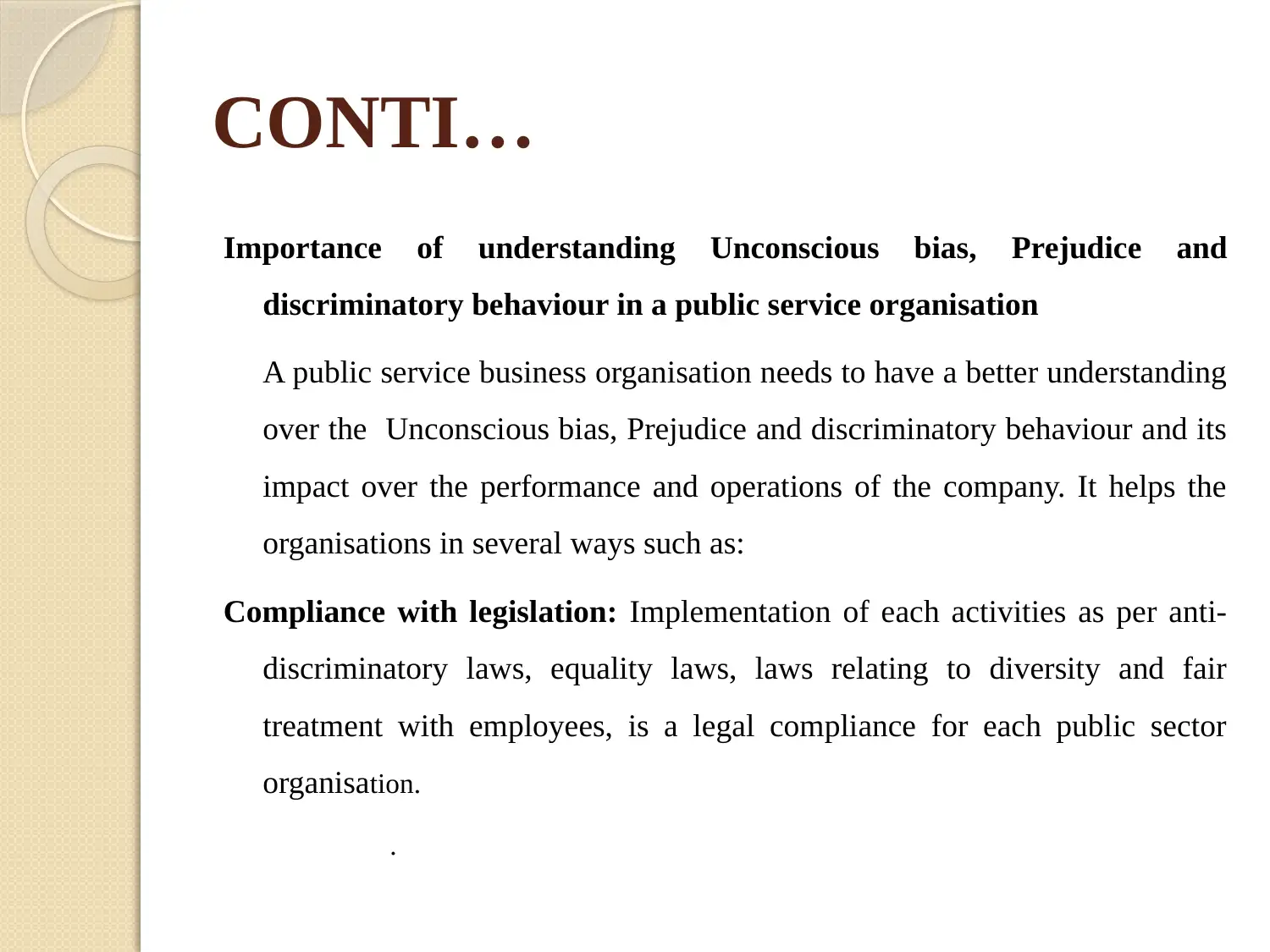
CONTI…
Importance of understanding Unconscious bias, Prejudice and
discriminatory behaviour in a public service organisation
A public service business organisation needs to have a better understanding
over the Unconscious bias, Prejudice and discriminatory behaviour and its
impact over the performance and operations of the company. It helps the
organisations in several ways such as:
Compliance with legislation: Implementation of each activities as per anti-
discriminatory laws, equality laws, laws relating to diversity and fair
treatment with employees, is a legal compliance for each public sector
organisation.
.
Importance of understanding Unconscious bias, Prejudice and
discriminatory behaviour in a public service organisation
A public service business organisation needs to have a better understanding
over the Unconscious bias, Prejudice and discriminatory behaviour and its
impact over the performance and operations of the company. It helps the
organisations in several ways such as:
Compliance with legislation: Implementation of each activities as per anti-
discriminatory laws, equality laws, laws relating to diversity and fair
treatment with employees, is a legal compliance for each public sector
organisation.
.
Paraphrase This Document
Need a fresh take? Get an instant paraphrase of this document with our AI Paraphraser

CONTI…
Improvement in customer relationship:
Development of strict penal provisions in the organisation would help the
public service organisation to develop more strictness and seriousness
among the employees about their behaviour towards their co workers and
customers of business as well.
In this regard, the managers of firm can become more sure about ethical
behaviour of staff with their customers. Therefore, this understanding can
help in building good relationship with customers as well.
Improvement in customer relationship:
Development of strict penal provisions in the organisation would help the
public service organisation to develop more strictness and seriousness
among the employees about their behaviour towards their co workers and
customers of business as well.
In this regard, the managers of firm can become more sure about ethical
behaviour of staff with their customers. Therefore, this understanding can
help in building good relationship with customers as well.
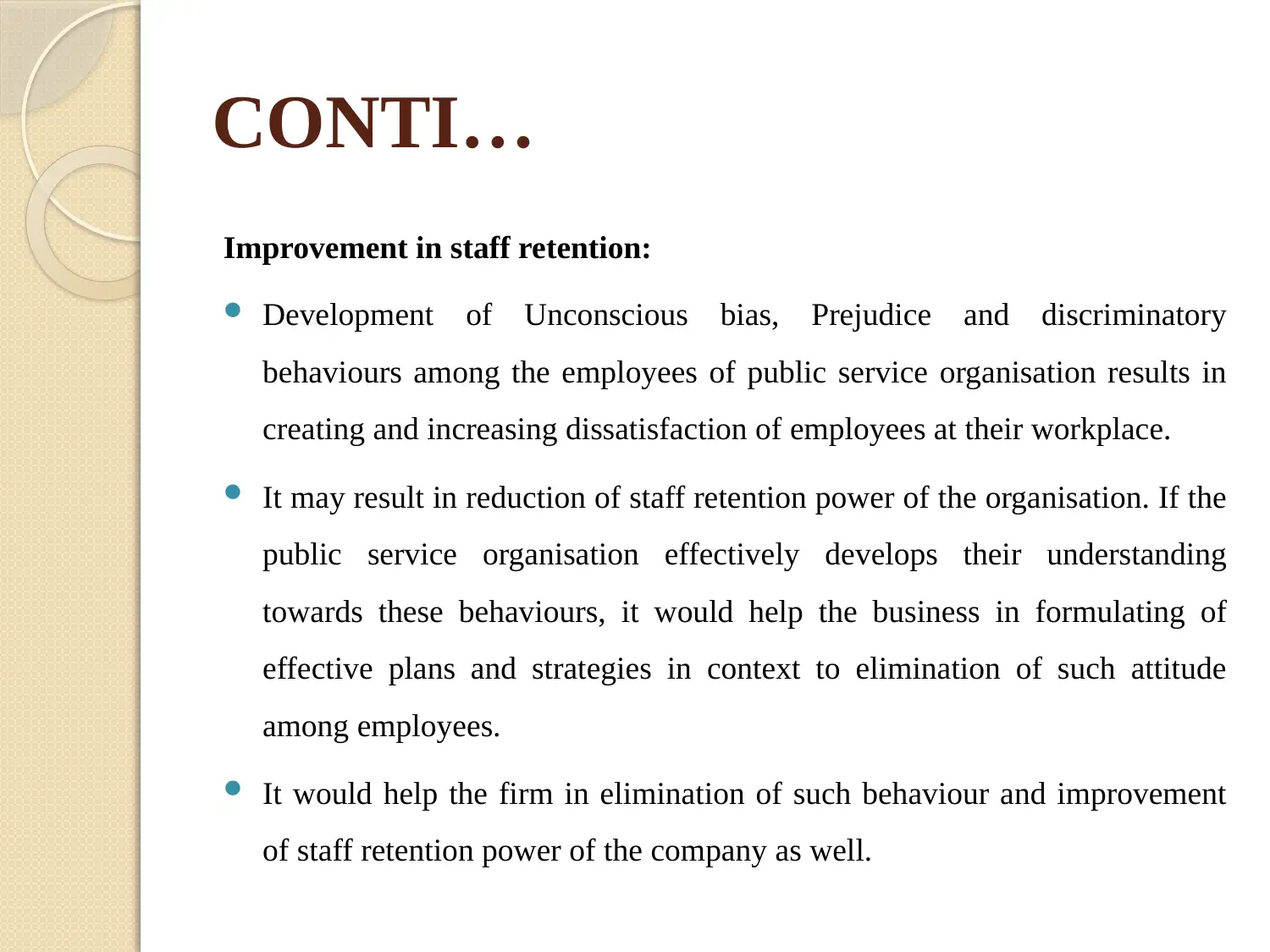
CONTI…
Improvement in staff retention:
Development of Unconscious bias, Prejudice and discriminatory
behaviours among the employees of public service organisation results in
creating and increasing dissatisfaction of employees at their workplace.
It may result in reduction of staff retention power of the organisation. If the
public service organisation effectively develops their understanding
towards these behaviours, it would help the business in formulating of
effective plans and strategies in context to elimination of such attitude
among employees.
It would help the firm in elimination of such behaviour and improvement
of staff retention power of the company as well.
Improvement in staff retention:
Development of Unconscious bias, Prejudice and discriminatory
behaviours among the employees of public service organisation results in
creating and increasing dissatisfaction of employees at their workplace.
It may result in reduction of staff retention power of the organisation. If the
public service organisation effectively develops their understanding
towards these behaviours, it would help the business in formulating of
effective plans and strategies in context to elimination of such attitude
among employees.
It would help the firm in elimination of such behaviour and improvement
of staff retention power of the company as well.
⊘ This is a preview!⊘
Do you want full access?
Subscribe today to unlock all pages.

Trusted by 1+ million students worldwide
1 out of 16
Related Documents
Your All-in-One AI-Powered Toolkit for Academic Success.
+13062052269
info@desklib.com
Available 24*7 on WhatsApp / Email
![[object Object]](/_next/static/media/star-bottom.7253800d.svg)
Unlock your academic potential
Copyright © 2020–2026 A2Z Services. All Rights Reserved. Developed and managed by ZUCOL.





